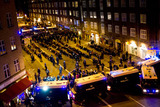
2009-12-14
Naomi Klein
The Danish need for control is a real problem at the climate talks, where protesters should be able to connect with delegates
On Saturday night, after a week of living off of conference centre snack bars, a group of us were invited to a delicious home-cooked meal with a real live Danish family. After spending the evening gawking at their stylish furnishings, a few of us had a question: why are Danes so good at design?
“We’re control freaks,” our hostess replied instantly. “It comes from being a small country with not much power. We have to control what we can.”

When it comes to producing absurdly appealing light fixtures and shockingly comfortable desk chairs, that Danish form of displacement is clearly a very good thing. When it comes to hosting a world-changing summit, the Danish need for control is proving to be a serious problem.
The Danes have invested a huge amount of money co-branding their capital city (now “Hopenhagen”) with a summit that will supposedly save the world. That would be fine if this summit actually were on track to save the world. But since it isn’t, the Danes are frantically trying to redesign us.
Take the weekend’s protests. By the end, around 1,100 people had been arrested. That’s just nuts. Saturday’s march of roughly 100,000 people came at a crucial juncture in the climate negotiations, a time when all signs pointed either to breakdown or a dangerously weak deal. The march was festive and peaceful but also tough. “The climate doesn’t negotiate” was the message, and western negotiators need to heed it.
When a handful of people starting throwing stones and setting off sound grenades (no, they weren’t “gunshots” as the Huffington Post breathlessly reported), the marchers handled it themselves, instructing the people responsible to leave the protest, which they promptly did. I was in that part of march and it barely interrupted my conversation. Calling this a “riot”, as the Daily Telegraph absurdly did, really isn’t fair to serious rioters, of which there are plenty in Europe.
Never mind. The Copenhagen cops used a little shattered glass as the pretext for detaining almost a thousand people, hundreds of whom were corralled together, forced to sit on the freezing pavement for hours, with wrists cuffed (and some ankles too). According to organiser Tadzio Müller, these were not the people who threw rocks but “the treatment was humiliating”, with some of the detainees urinating on themselves because they were not allowed to move. The arrests, part of a pattern all week, felt like a warning: deviations from the “Hopenhagen” message would not be tolerated.
Inside the official summit, delegates apparently gathered around flat screen TVs and watched the police breaking up the march and pushing groups of protesters against walls.
For some it must have felt familiar. After all, that’s pretty much what the Danish government and other western powers have been doing here all week: trying to break up the G77 bloc of developing countries by using classic divide and conquer tactics, including pushing especially vulnerable states up against the wall with special offers.
Having learned nothing from the “leaked Danish text”, this evening featured a meeting of 40 invited states to hash out a deal; the rest of the ministers from the 192 states represented have no idea what they decided – hardly the democracy promised by the UN.
The real test of Danish control issues will come on Wednesday, at the Reclaim Power action. In the morning demonstrators are going to march to the Bella Centre to demand real solutions to the climate crisis, not the fuzzy maths and carbon trading on offer inside. The delegates on the inside who feel the same way – and there are thousands – are being invited to join the demonstrators.
If all goes well, somewhere in the vicinity of the Bella Centre will be a “people’s assembly”, a chance to highlight some of the many common sense solutions that have been shut out of the official negotiations, including keeping Alberta’s tar sands in the ground, and paying climate “reparations”.
The organisers of Reclaim Power have stated clearly that they are committed to non-violent civil disobedience. Even if attacked by police, they will not respond with violence. Still, the spectre of unscripted dissent upstaging the official conference on Wednesday no doubt has our Danish hosts deeply freaked out.
Let’s hope they don’t deal with their control issues by trying to hoard everyone into pens: the protesters kept far from the Bella Centre; the delegates locked inside. Because this action – more than anything that has happened so far – has the potential to send a clear and much-needed message to the world: only a deal that is dictated by both science and justice will do.
So memo to our Danish hosts: sure, Copenhagen is your city, and we love you for your bicycles and windmills. But it’s everyone’s our planet. Stop trying to design us out of the picture.